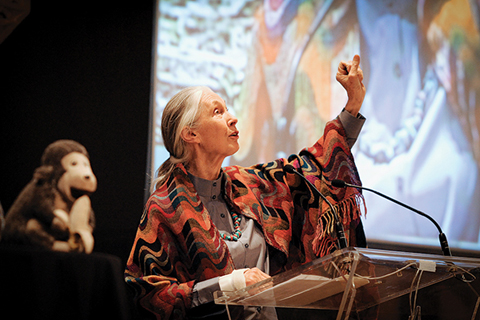Students are learning first-hand about protecting some of the world’s endangered species and habitat through U of T’s innovative collaboration between the School of the Environment and the Jane Goodall Institute of Canada.
Last summer, two students took part in JGI Canada’s first field internships, spending three months in western Uganda assessing the impact of its environmental initiatives. “My internship allowed me to fully engage in both the practice and theory of anthropology and conservation,” says intern Emma Cancelliere. “It gave me the opportunity to try so many new things and really push myself outside my limits to grow as a person and as an academic.”
In a presentation at the university last November, Cancelliere, a biological anthropology undergrad, shared her findings on how villagers feel about nearby primates and JGI’s conservation activities. In a survey she conducted, she learned that most villagers have a good understanding of local environmental issues, but have poor attitudes toward primates, largely viewing them as a threat to their safety and their crops.
“There’s nothing like getting out to Africa for that first-hand experience and gaining a global perspective on these issues,” says Don Jackson, interim director at the School of the Environment and a professor in the department of ecology and evolutionary biology. “There’s also the potential for joint research between the institute and faculty, which will provide opportunities for collaborative work with undergraduate and graduate students.”
The institute, which has partnered with U of T’s School of the Environment since 2007, enables students and faculty to learn about and preserve at-risk wildlife and habitat in Congo, Uganda and Tanzania. Focusing on primate research, forest restoration, community-based conservation and sustainable development, the programs have sparked teaching, volunteer and field education experiences.
“It’s a good fit for us to be here because we have common goals with the school, and we can offer students hands-on experience working with an environmental NGO,” says Jane Lawton, CEO of JGI Canada. The institute, which is located at the School of the Environment, is one of several offices of the 36-year-old global organization.
Students can engage in JGI Canada’s projects by volunteering or working at its office. The organization also awards an annual scholarship worth about $1,000 to a student with high marks and a strong interest in environmentalism and eco-friendly development.
Recent Posts
People Worry That AI Will Replace Workers. But It Could Make Some More Productive
These scholars say artificial intelligence could help reduce income inequality
A Sentinel for Global Health
AI is promising a better – and faster – way to monitor the world for emerging medical threats
The Age of Deception
AI is generating a disinformation arms race. The window to stop it may be closing





